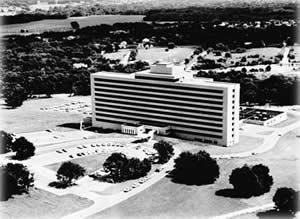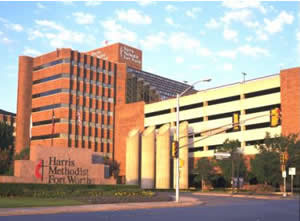Texas Health embraces its faith-based roots, claiming our foundations in the healing ministries of the Presbyterian Church and the United Methodist Church, as well as in the community-based health care represented by Texas Health Arlington Memorial Hospital.
We recognize the importance of caring for the whole person – body, mind and spirit – both in the practice and delivery of health care and in the life of the organization. We implement this in many ways, being mindful of respecting and welcoming the broad spectrum of religious faiths and the different ways people nurture their spirit.
As a faith-based health system, we recognize our values are rooted in God’s spirit and reflected in the human spirit. These values embody who we ultimately are and how we relate to one another, our patients and our communities. We invest ourselves in our values and engage our tasks and responsibilities in a spirit of respect, integrity, compassion and excellence.

-
Presbyterian Hospital of Dallas
 Presbyterian Hospital of Dallas was the first hospital built in the Presbyterian Healthcare System, which eventually joined with the Harris Methodist Health System and Arlington Memorial Hospital to form Texas Health Resources.
Presbyterian Hospital of Dallas was the first hospital built in the Presbyterian Healthcare System, which eventually joined with the Harris Methodist Health System and Arlington Memorial Hospital to form Texas Health Resources. The initial vision for Presbyterian Hospital of Dallas was born one Sunday in the spring of 1955. Dr. William M. Elliott Jr. had completed his sermon at Highland Park Presbyterian Church when Frank H. Kidd Jr., M.D. suggested to him that Dallas needed a new hospital affiliated with the church. Elliott had had the same idea, and a steering committee was formed that summer that eventually became the hospital's first board of trustees.
To keep the hospital rooted in the Presbyterian Church, the steering committee determined that at least 12 to 15 of the hospital's original trustees would have to be members of a Presbyterian Church and at least one minister of each of the three Presbyteries would be on the governing board. The influence of these Presbyterians shaped the foundational years of the hospital, and their legacy lives on today.
-
Harris Methodist Hospital
 Harris Methodist Hospital was the first hospital built in the Harris Methodist Health System, which eventually joined with Presbyterian Healthcare System and Arlington Memorial Hospital to form Texas Health Resources. A West Texas country doctor turned entrepreneur with a vision for innovation, Dr. Charles Houston Harris moved to Fort Worth in 1904 and built a 50-bed hospital and nursing school eight years after arriving.
Harris Methodist Hospital was the first hospital built in the Harris Methodist Health System, which eventually joined with Presbyterian Healthcare System and Arlington Memorial Hospital to form Texas Health Resources. A West Texas country doctor turned entrepreneur with a vision for innovation, Dr. Charles Houston Harris moved to Fort Worth in 1904 and built a 50-bed hospital and nursing school eight years after arriving. Willing to pioneer the future of medicine in Tarrant County, Dr. Harris offered his hospital - worth $100,000 - to leaders of the Methodist Church in Fort Worth as the seed for a fine public facility and the only Methodist hospital south of St. Louis, Mo. and Memphis, Tenn. In 1920, he deeded his hospital and $50,000 cash for the venture to the Central Texas Conference of the Methodist Church. The conference accepted the offer and appointed a board to oversee the project.
Today, Texas Health Harris Methodist Hospital Fort Worth is a member of the United Methodist Association of Health and Welfare Ministries, a group of 300 denomination-related health and human services organizations. The Methodist cross and flame can be found at each of the original Harris Methodist Hospitals, serving as a reminder of their foundation in the Methodist Church.

